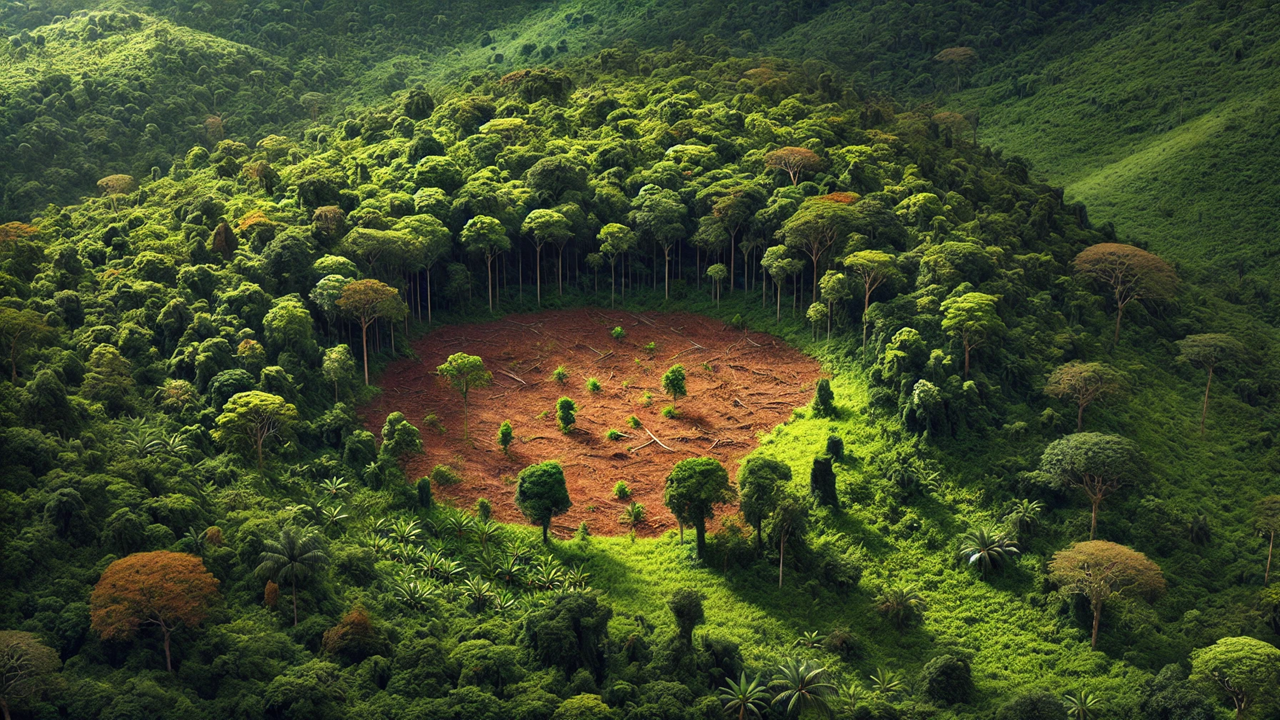Cameroon’s Economic Growth Hinges on Sustainable Forestry: A Call for Fiscal Reforms
Based on the Cameroon Economic Update, June 2024: Fiscal Instruments for Sustainable Forestry by the World Bank, this article discusses Cameroon’s economic and environmental challenges. It highlights the urgent need for fiscal policy reforms to promote sustainable forestry management to boost public revenue and protect vital ecosystems. The article emphasizes that adopting climate-smart policies and enhancing governance are key to balancing economic development with environmental sustainability.

Cameroon’s Economy Faces Environmental and Fiscal Challenges
Cameroon, a country rich in natural resources and biodiversity, is grappling with a slowdown in economic growth and rising inflation. A recent report by the World Bank titled Cameroon Economic Update, June 2024: Fiscal Instruments for Sustainable Forestry sheds light on the pressing need to balance economic development with environmental sustainability. The report emphasizes that leveraging fiscal tools to promote sustainable forestry management can be a key strategy to navigate these intertwined challenges.
In 2023, Cameroon’s economic growth decelerated to 3.3 percent, down from 3.6 percent in the previous year. The economy is currently facing headwinds such as declining hydrocarbon production, rising domestic inflation, and ongoing internal conflicts. These factors have exacerbated the country's fiscal situation, resulting in a widening current account deficit, which stood at 4 percent of GDP in 2023. Amidst these economic woes, the forestry sector, which covers approximately 35 percent of Cameroon’s land area and contributes significantly to the nation’s GDP, is under severe strain due to deforestation and poor management.
Sustainable Forestry Management: An Economic Imperative
The World Bank report highlights the crucial role that forests play in Cameroon’s economy. The forestry sector has consistently contributed around 3.8 percent to the national GDP over recent years. However, despite the sector’s potential, deforestation rates are alarmingly high, driven by illegal logging, agricultural expansion, and unregulated mining activities. The challenge is compounded by the lack of effective governance, which has hindered sustainable forest management.
With an annual deforestation rate rising from 0.1 percent to 0.6 percent between 2008 and 2020, Cameroon is losing valuable forest cover at an accelerating pace. This not only threatens the livelihoods of communities that depend on these resources but also undermines efforts to combat climate change. The World Bank suggests that fiscal policies could be restructured to encourage sustainable practices in the forestry sector, which would not only protect the environment but also generate much-needed public revenue.
Fiscal Policy Reforms: A Tool for Environmental and Economic Stability
The report proposes that Cameroon adopt a range of fiscal reforms that differentiate between sustainable and unsustainable forestry practices. One of the core recommendations is the introduction of a “bonus-malus” system, a type of tax incentive that rewards sustainable practices while penalizing those that contribute to environmental degradation. This approach would encourage logging companies and agricultural enterprises to adopt more environmentally friendly methods.
Additionally, fiscal instruments such as environmental taxes, tradable permits, and payments for ecosystem services could be leveraged to drive positive change in the forestry sector. The report also calls for a re-evaluation of the country’s forestry-related tax policies to enhance public revenues. Currently, forest taxes contribute only 0.2 percent of GDP, which is disproportionately low given the sector’s economic significance. By introducing climate-smart fiscal policies, Cameroon could unlock additional financial resources that could be reinvested in forest management and local communities.
Integrating Sustainable Practices into National Strategies
Aligning these fiscal reforms with Cameroon’s broader economic and development strategies is crucial. The report emphasizes the need for a coordinated approach that integrates sustainable forestry management into the national development strategy. This involves not just policy reforms but also enhancing governance structures, strengthening regional cooperation, and ensuring community participation in forest management.
Cameroon’s journey toward sustainable economic growth is also dependent on its ability to attract international climate finance. Initiatives like REDD+ (Reducing Emissions from Deforestation and Forest Degradation) could provide much-needed funding for forest conservation efforts. The World Bank underscores that by implementing transparent and robust fiscal policies, Cameroon can present itself as a reliable partner for international donors and investors, thereby increasing the flow of climate finance into the country.
A Strategic Outlook for 2030
Looking ahead, the World Bank projects that Cameroon’s medium-term economic growth could stabilize around 4.5 percent by 2027, provided that the recommended fiscal and governance reforms are implemented effectively. However, without addressing the challenges in the forestry sector, this growth could be undermined by continued environmental degradation and unsustainable practices.
The report concludes that Cameroon must strike a delicate balance between economic growth and environmental sustainability. Fiscal reforms that promote sustainable forestry practices, enhanced governance, and regional cooperation are essential to ensuring that Cameroon can meet its development and climate goals by 2030. As the country faces rising economic and environmental pressures, the time for decisive policy action is now.
- FIRST PUBLISHED IN:
- Devdiscourse
ALSO READ
Digital Transformation Powers Growth in Services Sector Across East Asia and Pacific: World Bank Report
Kosovo Urged to Invest $2.8 Billion in Climate Resilience and Renewable Energy Transition by 2030: World Bank Report
Amazon's Deforestation Dilemma: Beef Industry's Role Unveiled Ahead of COP30
World Bank Report: North Macedonia Must Strengthen Fiscal Discipline to Accelerate EU Convergence
World Bank Reports Outline Strategies for Strengthening Mongolia’s Financial and Private Sectors










